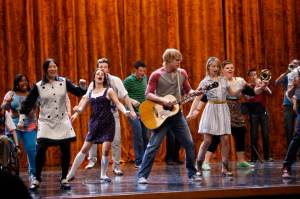
FOX
Spoilers for last night’s Glee:
Fleetwood Mac’s Rumours is a classic of pop rock, a genre that Glee introduced itself to the world with (Journey’s “Don’t Stop Believin'”). And it’s a notoriously personal work, inspired by the couplings and decouplings within the group, compounded by gossip and misinformation outside the group—pretty much the essence of at least of two-thirds of Glee episodes. So it’s amazing Ryan Murphy took this long to structure an hour around the album.
And while “Rumours” had its flaws—for starters, this was another of those episodes, like “Funk,” that felt required to state its name in the dialogue every 90 seconds—the structure allowed the show to serve the stories, rather than feeling like the stories were there to service the songs.
The episode’s “rumors” (or did they write the British ‘u’ into the actual dialogue?) came courtesy of Sue Sylvester, who resurrected a school gossip rag to drive a variety of wedges into the Glee club. Sue has become a distracting, outsized character over the last year, and her outbursts less and less plausible; meanwhile, she’s not really credible as a threat, since we now expect that she will keep trying to destroy the Glee Club and failing, Wile E. Coyote-like. But this episode suggests a a better way for the show to use her.
Essentially, “Rumours” recognized that she is not really a character but a human obstacle. Her role is to sow confusion among the characters whose stories really matter, to make trouble and therefore provide a reason for their stories and romances to advance—sort of like a mischievous forest sprite in a Shakespeare play, but taller and in a track suit. This allows her to do all the mustache-twirling and instigation that the audience loves without becoming too much of a liability, because the story’s not really about her; it also lets her provide a peripheral role for characters, like Terri, that the show no longer knows what to do with but can’t bring itself to get rid of. (And she gets to dress like David Bowie and Ann Coulter, for no real reason! It’s a win-win!)
Having said that, it’s worth noting that “Rumours” was at least a partial exception to the rule that Glee is best when it is about the adults as little as possible. Will’s various romantic dilemmas have never been too compelling, but last night the show made him interesting by focusing on a conflict that makes sense: namely, whether he’s given up too much by devoting himself to his kids and the school.
It’s a conflict that I hope the show does more with, not only to give Matthew Morrison something more interesting to do than write the theme on a whiteboard every week. When he’s mooning over Holly or agonizing over Emma, it often feels perfunctory, like the show is trying to throw in a little something for the grownups. But to have him wondering about his own career—did he give up on his ambitions, and is he actually good enough to pursue them—is an effective counterpoint to the stories of the kids on the show. Glee is a show about—cue Stevie Nicks—”Dreams,” but at the series’ best its optimism is cut with a poignance: the reminders that, from all the evidence around them in Lima, most of the New Directions kids’ dreams are not going to come true exactly as envisioned.
That message came through in the episode’s close, when we learned how hard up Sam’s family is now that his dad is unemployed. On the one hand, the revelation felt a little abrupt and rushed—we had about a minute and a half to see the tough spot Sam is in—before immediately moving on to inspiration (the reclaimed guitar) and catharsis (“Don’t Stop Thinkin’ About Tomorrow”). But Chord Overstreet sold Sam’s feeling of loss, even as he held things together for his younger siblings, and the episode didn’t end with the message that one song was going to fix anything.
As for the rest of the episode: well, a lot of romantic intrigue, as you would expect from an episode titled “Rumours.” But it was all well-handled; in particular, the songs were integrated into the drama rather than feeling like excuses for iTunes singles. (I especially liked the smoldering hostility between Finn and Quinn on “I Don’t Want to Know.”) In all—compared with, say, “The Power of Madonna”—this was a good example of how to use the songs of a single artist for something greater than their own sake, and I hope Glee does it again before long. ELO’s “Out of the Blue,” your day will come!
Now the hail of bullets:
* While we’re talking about the album, credit where due to Glee for choosing some non-obvious tracks from the album, including “Songbird” and “Never Going Back Again.” (And on the latter, it was good to see New Directions finally collaborating with the McKinley High Acoustic Guitar Club!) I might have liked to have heard “Second Hand News” (hence my title), and “The Chain” may have made a more dramatic Finn/Quinn duet, but I’d rather the producers choose the songs to suit the storytelling than to serve as my personal jukebox.
* “What about him?” [Indicates piano guy] “He’s just furniture.”
* Speaking of which, I’ve always liked Heather Morris, but who would have guessed that Brittany would become as much of an emotional fulcrum on the show as she has?
* “Is there protein powder in this margarita?” “And a wee bit of placenta!” See, there are reasons I want Jane Lynch to stick around here.
* Which are the more challenging scenes for a Glee actor: sitting in the glee-club room, singing along with someone else’s solo, or sitting in the glee-club room, awkwardly watching April duet with Will?
* If “Fondue for Two” does not become a regular webisode (“Lord Tubbington eats only HUMAN food!”), then TV-Internet synergy will truly have failed us.


